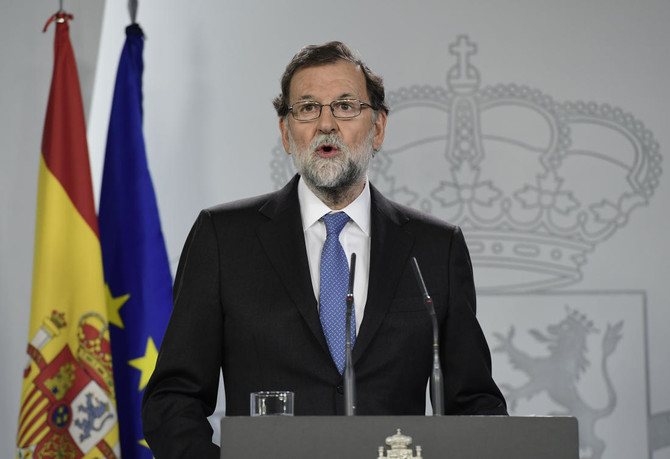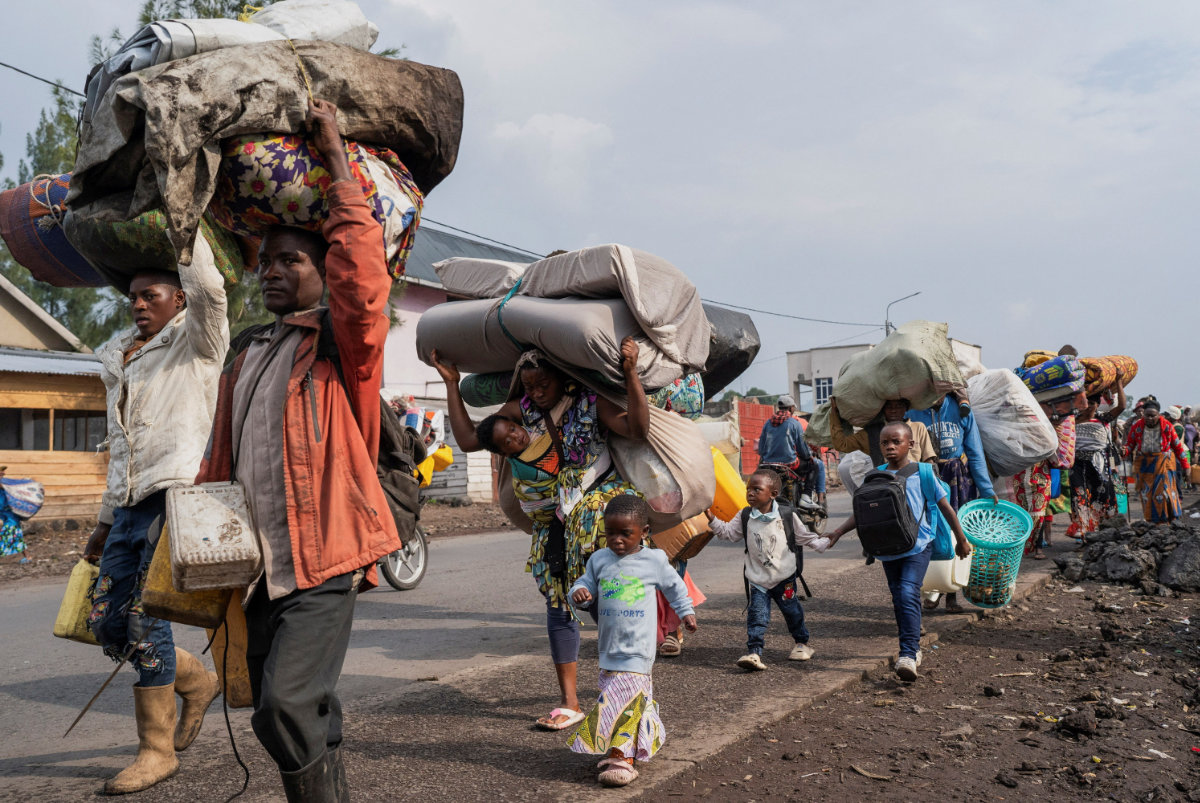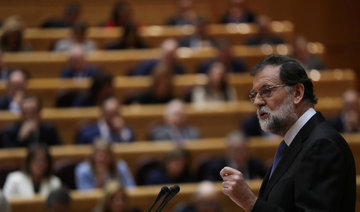MADRID: Spain’s control over Catalonia will be tested on Monday when politicians and civil servants return to work amid uncertainty over whether they will accept direct rule imposed by the central government to stop the region’s independence bid.
Hundreds of thousands of supporters of a unified Spain filled Barcelona’s streets on Sunday in one of the biggest shows of force yet by the so-called silent majority that has watched as regional political leaders push for Catalan independence.
Spain’s Prime Minister Mariano Rajoy assumed direct control of the region on Friday. He sacked its secessionist government and called a snap election for Dec. 21.
However, some of the most prominent members of the Catalan administration, including its president Carles Puigdemont and vice president Oriol Junqueras, said they did not accept the move and only the people of Catalonia could dismiss them.
The main civic group behind the pro-independence campaign have called for widespread civil disobedience and have given detailed instructions to the around 200,000 civil servants working for the Catalan region of how they should behave.
Most of them start their working day at 9 a.m. (0800 GMT) and, if too many did not turn up or decided not to accept instructions, it would cast important doubts over the Spanish government’s strategy to draw a line under a one-month crisis that has dented economic growth and fueled social unrest.
It is also not clear if senior government officials and lawmakers who declared the region’s independence from Spain on Friday would try to gain access to their offices and if the Catalan police Mossos d’Esquadra would prevent them.
La Vanguardia newspaper said on Sunday members of the Catalan cabinet had left their offices, which were now under the central government’s effective control.
Several Spanish ministers said at the weekend they were convinced civil servants would obey orders and reminded that those who did not could lose their job.
Spain’s interior ministry named a new chief for the regional police on Saturday who has insisted that the 17,000 officers of the force should remain neutral.
Interior Minister Juan Ignacio Zoido praised the Mossos for their work in an open letter on Sunday and urged them to accept temporary direction from Madrid.
“We have opened a new chapter and in this new chapter the Mossos d’Esquadra will become again the police of all the Catalans. This is your duty,” Zoido said in the letter.
Another test of the government’s response will be whether companies stop relocating out of Catalonia in search of stability and legal certainty after several hundred moved out earlier this month.
The government’s move to impose direct rule received the backing of several influential Catalan business lobbies who called on firms to stay in the region.
Spain’s control over Catalonia to be tested on Monday as work resumes
Spain’s control over Catalonia to be tested on Monday as work resumes

UN Security Council demands pullout of Rwanda-backed armed group from DR Congo

- UN Security Council condemns ‘flagrant disregard’ for sovereignty in DR Congo
- Congo late Saturday broke off relations with Rwanda, which has denied backing the M23 despite evidence collected by UN experts and others
- US, France tells Rwanda to back off, warning that the US would hold accountable those responsible for sustaining the armed conflict
UNITED NATIONS/GOMA, Congo: The UN Security Council on Sunday denounced the “flagrant disregard” for the sovereignty and territorial integrity of the Democratic Republic of Congo (DRC), demanding the withdrawal of “external forces” without explicitly naming them.
The Council “condemned the ongoing flagrant disregard for the sovereignty and territorial integrity of the DRC, including the unauthorized presence in the Eastern DRC of external forces as reported by the Group of Experts and demanded that these forces withdraw immediately,” it said in a statement Sunday evening, referencing a UN expert report that criticized the presence of Rwandan forces and their support for the M23 armed group fighting the Congolese army.
During an emergency meeting of the Security Council, UN‘s special representative for Congo said the attacking forces has caused “mass panic” in eastern Congo’s largest city, Goma, a humanitarian and security hub and home to 2 million people.
“M23 has declared the airspace over Goma closed,” UN special representative, Bintou Keita said. “In other words, we are trapped.”

Keita said M23 fighters were using residents “as human shields” as they advanced, while others fled for their lives.
The M23 rebels’ offensive at the heart of the mineral-rich region threatens to dramatically worsen one of Africa’s longest wars and create further misery for what is already one of the world’s largest humanitarian crises, with millions of people displaced.
‘Declaration of war’
Congo late Saturday broke off relations with Rwanda, which has denied backing the M23 despite evidence collected by UN experts and others. Congo’s government called it a “declaration of war.”
The surge of violence has killed at least 13 peacekeepers over the past week. And Congolese were again on the run.
The M23 has made significant territorial gains along Congo’s border with Rwanda in recent weeks, after months of regional attempts to make peace failed. On Sunday night, the rebels called on Congo’s army to surrender their arms and present themselves at a local stadium by 3 a.m. or they would take the city.
The Uruguayan army, who are in Goma serving with the UN peacekeeping mission, said in a statement on X late Sunday that some Congolese soldiers have laid down their weapons.
“More than a hundred FARDC soldiers are sheltered in the facilities of the “Siempre Presente” base awaiting the (Disarmament, Demobilization and Reintegration) process,” the statement said.
In photos shared with the statement, armed men are seen registering with the peacekeepers in a mix of military uniforms and civilian clothing.
Congo’s foreign minister, Thérèse Kayikwamba Wagner, told the Security Council that Rwanda was committing “a frontal aggression, a declaration of war which no longer hides itself behind diplomatic maneuvers.”
Rwanda’s ambassador to the UN, Ernest Rwamucyo, did not confirm or deny Congo’s claims. He blamed Congo’s government, saying the crisis could have been been averted if it had “demonstrated a genuine commitment to peace.”
US and France weigh in
The United States and France called for a ceasefire and appealed to Rwanda to withdraw its support to M23, with acting US Ambassador Dorothy Shea warning that the US would “consider all the tools at its disposal” to hold accountable those responsible for sustaining the armed conflict.
In the past 48 hours, two UN peacekeepers from South Africa and one from Uruguay were killed and 11 others were injured and hospitalized, UN Secretary-General Antonio Guterres’ spokesman said ahead of the Security Council meeting.
The UN chief reiterated his “strongest condemnation” of the M23 offensive “with the support of the Rwanda Defense Forces,” and called on the rebel group to immediately halt all hostile action and withdraw, spokesman Stephane Dujarric said.
Congo, the United States and UN experts accuse Rwanda of backing M23, which is mainly made up of ethnic Tutsis who broke away from the Congolese army more than a decade ago. It’s one of about 100 armed groups that have been vying for a foothold in the mineral-rich region, where a long-running conflict has created one of the world’s largest humanitarian crises.
Rwanda’s government denies backing the rebels, but last year acknowledged that it has troops and missile systems in eastern Congo to safeguard its security, pointing to a buildup of Congolese forces near the border. UN experts estimate up to 4,000 Rwandan forces are in Congo.
Congo’s foreign ministry said late Saturday it was severing diplomatic ties with Rwanda and pulling all diplomatic staff from the country “with immediate effect.”
Rwandan Foreign Minister Olivier Nduhungirehe told The Associated Press on Sunday that the decision to cut ties was a unilateral move by Congo.
“For us, we took appropriate measures to evacuate our remaining diplomat in Kinshasa, who was under permanent threat by Congolese officials,” Nduhungirehe said.
The M23 took Goma once before in 2012, withdrawing after considerable international pressure was put on Rwanda.
Civilians flee the rebel advance
On Sunday morning, heavy gunfire resonated across Goma, a few kilometers (miles) from the front line. Scores of children and adults fled the Kanyaruchinya camp, one of the largest in eastern Congo for displaced people, near the Rwandan border.
“We are fleeing because we saw soldiers on the border with Rwanda throwing bombs and shooting,” said Safi Shangwe, who was heading into the city.
Some of the displaced worried they would not be safe in Goma, either. “I heard that there are bombs in Goma, too, so now we don’t know where to go,” said Adèle Shimiye.
Hundreds of people attempted to flee to Rwanda. Migration officers at a border crossing east of Goma carefully checked travel documents.
“I am crossing to the other side to see if we will have a place of refuge because for the moment, security in the city is not guaranteed,” Goma resident Muahadi Amani told the AP.
UN deputy humanitarian chief Joyce Msuya said the situation was rapidly deteriorating. “If hostilities spill into Goma – a densely populated urban center – the impact on civilians could be devastating,” she said.
Congo’s army has said it was fending off the M23 offensive with the help of allied forces, including UN peacekeepers and soldiers from the Southern African Development Community Mission, also known as SAMIDRC.
In addition to the two South African peacekeepers, seven South African troops with SAMIDIRC have been killed in recent days, South Africa’s defense ministry said.
Since 2021, Congo’s government and allied forces — including the 14,000-strong UN mission — have been keeping M23 away from Goma.
Goma resident Bahati Jackson’s family has been hearing gunfire and remembers fleeing M23’s seizure of the city in 2012. But this time, they’re staying.
“If we’re going to die, it’s better to die here,” Jackson said.
Elon Musk says $1 million election giveaway wasn’t an illegal lottery

- Arizona resident Jacqueline McAferty claimed that Musk and his political action committee America PAC falsely induced voters in seven battleground states to sign the petition by promising that winners would be chosen randomly
WASHINGTON: Elon Musk asked a federal judge to dismiss a proposed class action by voters who said the world’s richest person defrauded them into signing a petition to support the US Constitution for a chance to win his $1 million-a-day giveaway.
In a late Friday filing in the Austin, Texas federal court, Musk rejected the claim the giveaway was an illegal “lottery” that violated a Texas law against deceptive trade practices.
Arizona resident Jacqueline McAferty claimed that Musk and his political action committee America PAC falsely induced voters in seven battleground states to sign the petition by promising that winners would be chosen randomly.
Musk founded America PAC to support Republican Donald Trump’s successful 2024 presidential run.
According to Musk, however, voters were told they would be reviewed for an opportunity to earn the $1 million by becoming America PAC spokespeople.
This, Musk said, defeated any notion that the money was a “prize” to be won.
“Make no mistake: an eligible voter’s opportunity to earn is not the same thing as a chance to win,” Musk said.
Chance, he added, “was not involved here.”
Musk also rejected the suggestion that petition signers suffered harm by providing their names, addresses and phone numbers, which they said Musk and America PAC could then sell.
Lawyers for the proposed class did not immediately respond to requests for comment on Sunday.
The lawsuit was filed on Election Day, Nov. 5, 2024.
A day earlier, a Philadelphia judge refused to end Musk’s giveaway, saying that city’s top prosecutor also failed to show it was an illegal lottery.
McAferty’s lawsuit seeks at least $5 million in damages for everyone who signed the petition.
Musk is a Texas resident and his electric car company Tesla is based in Austin.
The case is McAferty v Musk et al, US District Court, Western District of Texas, No. 24-01346.
Zelensky again replaces commander of Ukraine’s key eastern front

- Russian forces have been steadily advancing in eastern Ukraine’s Donetsk region toward Pokrovsk, bypassing it from the south and trying to cut off supply routes to Ukraine’s troops
MELBOURNE: President Volodymyr Zelensky on Sunday replaced for the third time in under a year the commander of a key Ukrainian military formation responsible for defending the eastern hub of Pokrovsk that’s under increased risk of falling to Russian forces.
Zelensky, in his nightly video address, said he put Ukraine’s new commander of ground forces, Major General Mykhailo Drapatyi, in charge of the Khortytsia operational-strategic group, whose area of responsibility includes much of Ukraine’s eastern front.
“These are the toughest areas of fighting,” Zelensky said, adding that he had discussed the changes at meeting with Ukraine’s Commander-in-Chief Oleksandr Syrskyi.
Russia’s capture of the city would bring it closer to seizing the entire Donetsk region, which has been one of President Vladimir Putin’s key goals in his war in Ukraine.
Zelensky added that Drapatyi’s appointment will help to combine the combat work of the army with the proper training of brigades.
“It is the front-line needs that should determine the standards for staffing and training of brigades,” he said.
Drapatyi will replace Major General Andriy Hnatov, who has been in charge of Khortytsia since June and who will become a Deputy Chief of the General Staff to run training and communication.
Russian forces have been steadily advancing in eastern Ukraine’s Donetsk region toward Pokrovsk, bypassing it from the south and trying to cut off supply routes to Ukraine’s troops.
Pokrovsk, which had a pre-war population of around 60,000, has been one of Ukraine’s main defensive strongholds in the Donetsk region and the focus of fierce fighting for months.
Trump imposes tariffs, sanctions on Colombia after it refuses deportation flights

- Colombia is the second Latin American nation to refuse US military deportation flights
WASHINGTON/BOGOTA: President Donald Trump said on Sunday he will impose sweeping retaliatory measures on Colombia, including tariffs and sanctions, after the South American country turned away two US military aircraft with migrants being deported as part of the new US administration’s immigration crackdown.
Colombia, the third largest US trading partner in Latin America, swiftly responded, threatening a 50 percent tariff on US goods. The country’s leftist president, Gustavo Petro, later posted on X that he directed his trade minister to increase tariffs on US imports by 25 percent.
Colombia is the second Latin American nation to refuse US military deportation flights. Trump’s punitive action demonstrated his more muscular US foreign policy and his renewed willingness to force countries to bend to his will.
Trump wrote on Truth Social that Petro’s refusal to accept the flights jeopardized US national security.
The retaliatory measures include imposing 25 percent tariffs on all Colombian goods coming into the US, which will go up to 50 percent in one week; a travel ban and visa revocations on Colombian government officials; and emergency treasury, banking and financial sanctions.
Trump said he would also direct enhanced border inspections of Colombian nationals and cargo.
“These measures are just the beginning,” he wrote. “We will not allow the Colombian Government to violate its legal obligations with regard to the acceptance and return of the Criminals they forced into the United States!“
He later posted a picture of himself on Truth Social in a pinstripe suit and a fedora in front of a sign reading FAFO, a common slang acronym for “Fuck Around and Find Out.”
America will “no longer be lied to nor taken advantage of,” US Secretary of State Marco Rubio in a statement, adding that Petro had authorized these flights but then canceled his authorization when the planes were in the air.
SWEEPING CRACKDOWN
Trump declared illegal immigration a national emergency and imposed a sweeping crackdown since taking office last Monday. He directed the US military to help with border security, issued a broad ban on asylum and took steps to restrict citizenship for children born on US soil.
Colombia’s Petro condemned the practice on Sunday, suggesting it treated migrants like criminals. In a post on social media platform X, Petro said Colombia would welcome home deported migrants on civilian planes.
“The US cannot treat Colombian migrants as criminals,” Petro wrote.
Petro said even though there were 15,660 Americans without legal immigration status in Colombia, he would never carry out a raid to return handcuffed Americans to the US
“We are the opposite of the Nazis,” he wrote.
Mexico also refused a request last week to let a US military aircraft land with migrants.
Trump did not take similar action against Mexico, the largest US trading partner, but has said he was thinking about imposing 25 percent duties on imports from Canada and Mexico on Feb. 1 to force further action against illegal immigrants and fentanyl flowing into the US
The US is Colombia’s largest trading partner, largely due to a 2006 free trade agreement, with $33.8 billion worth of two-way trade in 2023 and a $1.6 billion US trade surplus, according to US Census Bureau data.
The biggest US imports from Colombia that year were crude oil, gold, coffee, and cut roses. Top US exports to Colombia were gasoline and other petroleum products, commercial aircraft, corn, crude oil and soybeans.
“Petro’s finding out that tweets have consequences. He’s not (facing) a US counterpart that looks at Colombia through a strategic lens, as a key ally, but as a country to make an example of,” said Sergio Guzman, director of consultancy Colombia Risk Analysis. Guzman added that financial sanctions could be economically crippling.
Alejo Czerwonko, chief investment officer for emerging markets Americas at UBS Global Wealth Management, said Colombia relied on access to the US market for about a third of its exports, or about 4 percent of its GDP.
“In addition, the Petro-Trump relationship has started off on the wrong foot, which could signal additional challenges ahead,” Czerwonko told Reuters.
GROWING DISCONTENT
Petro’s comments added to the growing chorus of discontent in Latin America as Trump’s week-old administration starts mobilizing for mass deportations.
Brazil’s foreign ministry on Saturday condemned “degrading treatment” of Brazilians after migrants were handcuffed on a commercial deportation flight. Upon arrival, some passengers also reported mistreatment during the flight, according to local news reports.
The plane, which was carrying 88 Brazilian passengers, 16 US security agents, and eight crew members, had been originally scheduled to arrive in Belo Horizonte in the southeastern state of Minas Gerais.
However, at an unscheduled stop due to technical problems in Manaus, capital of Amazonas, Brazilian officials ordered removal of the handcuffs, and President Luiz Inácio Lula da Silva designated a Brazilian Air Force (FAB) flight to complete their journey, the government said in a statement on Saturday.
The commercial charter flight was the second this year from the US carrying undocumented migrants deported back to Brazil and the first since Trump’s inauguration, according to Brazil’s federal police.
US officials did not reply to requests for comment about Brazil.
The use of US military aircraft to carry out deportation flights is part of the Pentagon’s response to Trump’s national emergency declaration on immigration on Monday.
In the past, US military aircraft have been used to relocate individuals from one country to another, like during the US withdrawal from Afghanistan in 2021.
This has been the first time in recent memory that US military aircraft were used to fly migrants out of the country, one US official said.
US military aircraft carried out two similar flights, each with about 80 migrants, to Guatemala on Friday.
Trump defense chief reaffirms full US support to Israel in call with Netanyahu

- Hegseth and Netanyahu “discussed the importance of advancing mutual security interests and priorities,” said a Pentagon statement
- The statement did not specify why Hegseth spoke with Netanyahu instead of his direct counterpart Israel Katz
WASHINGTON: US Defense Secretary Pete Hegseth spoke with Israeli Prime Minister Benjamin Netanyahu on Sunday in the Pentagon chief’s first call with a foreign official since being sworn in.
Hegseth and Netanyahu “discussed the importance of advancing mutual security interests and priorities, especially in the face of persistent threats,” the Pentagon said in a statement.
“The secretary stressed that the United States is fully committed, under President (Donald) Trump’s leadership, to ensure that Israel has the capabilities it needs to defend itself,” according to the statement, which did not specify why Hegseth spoke with Netanyahu instead of his direct counterpart Israel Katz.
Hegseth was sworn in on Saturday after being narrowly confirmed by the US Senate the night before.
He was one of Trump’s most controversial cabinet nominees, facing allegations of alcohol abuse and sexual misconduct and concerns over his lack of experience leading a large organization.























